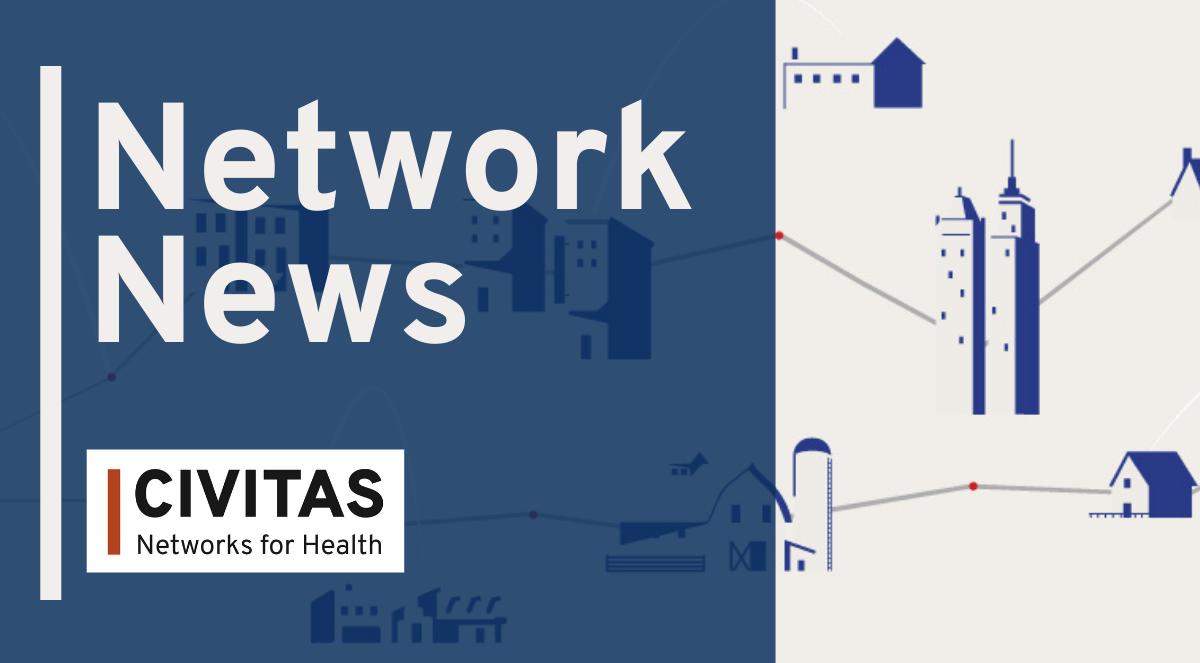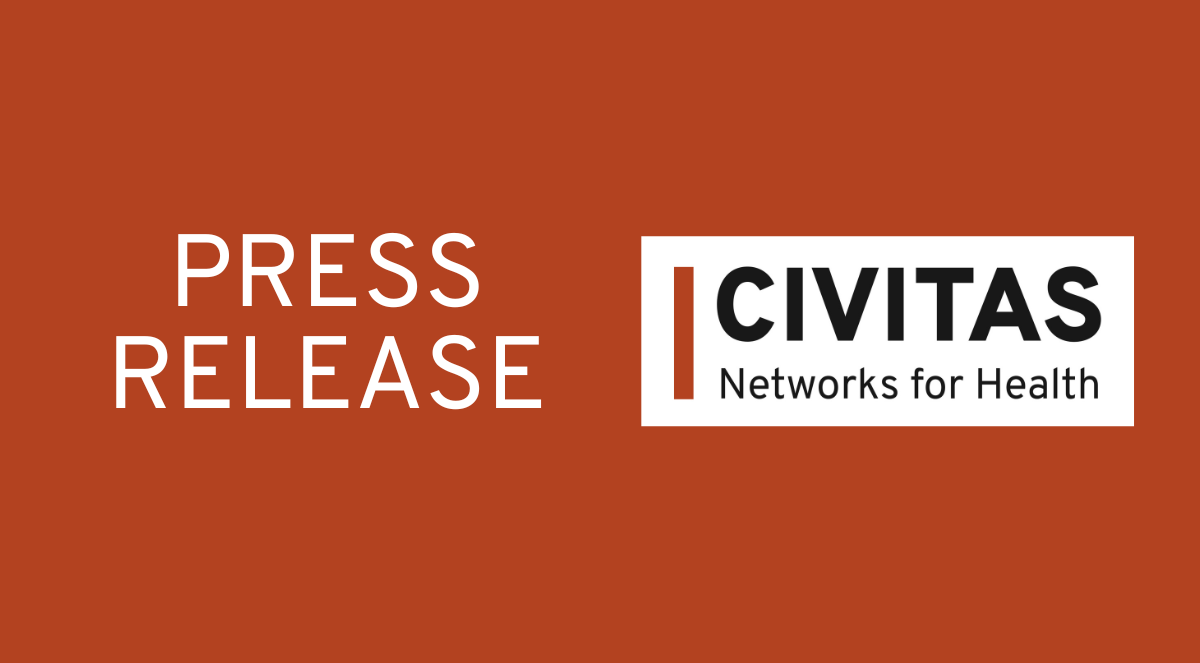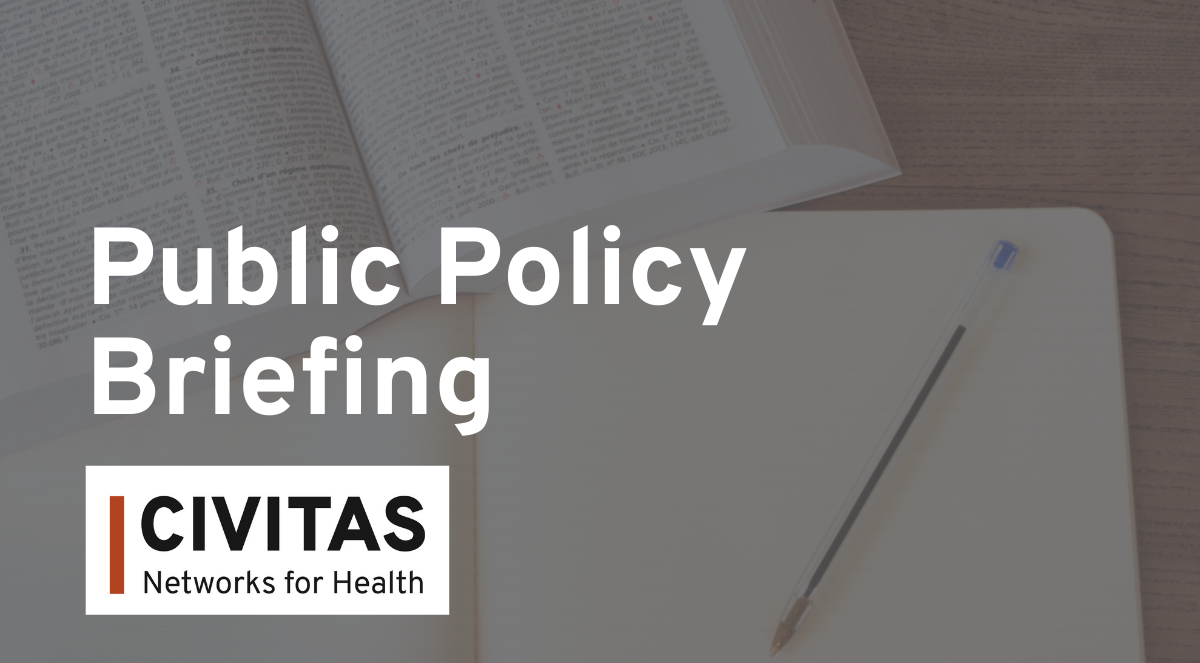Recapping the Civitas 2023 Annual Conference: The Bridge Between Data and Doing
By: Lisa Bari and Jolie Ritzo, Photo Credit: Malik Chambers
The Civitas 2023 Annual Conference, held in National Harbor, Maryland, brought together health care leaders, experts, and stakeholders from across the country to share various perspectives on the future of health data exchange and health and health care transformation. With a focus on turning data into action, the conference delivered a wealth of insights, fostering collaborations and partnerships that will shape the health care implementation and interoperability landscape in the year to come.
Coming away from the annual conference, we wanted to share some insights we gathered from our many keynote, unconference, breakout, and stakeholder sessions held throughout our three and half days together.
Here is what we heard we need more of:
Data-Driven Transformation
No surprise here – the central theme of the conference revolved around the idea that data is not merely information; it is a catalyst for change. Civitas and its members have emerged as an important bridge between data and actionable solutions. The health improvement and health information exchange (HIE) industry rallied around the convergence of ideas and organizations, emphasizing the need for more robust data exchange to equip stakeholders and communities in addressing today’s most pressing health care challenges.
Collaboration Over Competition
There is immense power in collaboration. Various entities such as HIEs, emerging Health Data Utilities (HDUs), Regional Health Information Collaboratives (RHICs), All-Payer Claims Databases (APCDs), Community-Based Organizations (CBOs), and Quality Improvement Organizations (QIOs) highlighted instances of unity to tackle issues like maternal health, the opioid crisis, and unmet social needs. The message was clear: to succeed, we must uncover common interests and work together to meet community needs.
Public-Private Partnerships for Transformation
You may have seen the tagline, “Public Private Partnerships Inspire Transformation” on the conference t-shirts, but it is more than just a catchphrase. The importance of partnerships in navigating the complexities of the health care system was a recurring theme this year, with an emphasis that partnerships are not built overnight – they require time, intentionality, and an understanding of different perspectives. Civitas members and stakeholders must continue to actively seek common ground to drive transformation.
Patient-Focused Solutions and Patient Involvement in Conversations
We heard repeatedly that we need to continue to have more patients and caregivers as a part of these conversations – and we wholeheartedly agree. To bring a new perspective to the table this year, our team invited Erin Moore, a patient advocate and founder of Meanwhile Health, to represent the needs of patients and caregivers who were not present. She voiced valuable insights for organizations to integrate patients into their increasingly inclusive processes and governance structures. Suggestions such as RHICs, HIEs, and HDUs* taking an active role developing and sharing patient education resources that help patients in understanding how sharing their data can lead to more informed care and better patient outcomes, ensuring patients are included in developing data sets and data use that are relevant to addressing the challenges faced by patients and caregivers, and building community governance structure so the interests of patients are at the heart of the work being done. While we were excited to increase the patient perspective in our conference sessions, we have further to go and look forward to continuing meaningful discussions at the Civitas 2024 Annual Conference.
Nonprofit Data-Led Entities
The conference acknowledged the vital role played by nonprofit, community-governed, data-led organizations in national interoperability and health improvement. These entities offer neutral convening, data stewardship, advanced technology, community investment, and inclusive governance structures, building trust between stakeholders and community partners. The conference highlighted that the last mile of connectivity often occurs at the local community level, where innovation and implementation thrive. By acting locally, this work will be relevant to the unique needs of the people being served.
Privacy, Security, and Consent Management
With patients increasingly wanting access to their health data and national interoperability drawing closer, the importance of privacy, security, and consent management are paramount. Civitas members were encouraged to leverage existing infrastructure and expertise while exploring new possibilities with what information the data can uncover to transform care delivery in multiple settings. The Civitas national network of member organizations was seen as a platform for shared learning and recommendations on best practices for privacy, security, and consent. While we have work to do in this area, we are optimistic about an interoperable future.
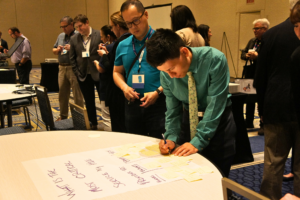
Relentless Support for Public Health
The conference underscored the significance of supporting public health advancements, including workforce development, data modernization, messaging campaigns, and emergency preparedness. Civitas members and partners were encouraged to collaborate with local and state public health agencies to develop meaningful solutions.
Addressing SDOH and Social Care
Speakers and attendees reiterated that Social Determinants of Health (SDOH), and health related social needs are distinct concepts that require uniquely different levers. SDOH are addressed through policy, while social care and needs are met in service settings. A notable example was given in one of the keynote sessions, noting that someone being hungry is a need – to address it, you give them food. The SDOH policy lever to be pulled there is to ensure there is an affordable grocery store in their neighborhood. This underlines how effective change requires different approaches to address these distinctly different, but complementary, concepts.
Embracing Dialogue and Collaboration
Last, but certainly not least, following many years of isolation and uncertainty during the height of the pandemic, in-person gatherings are celebrated for their ability to foster dialogue, working sessions, and workshops. Participants enjoyed working together side-by-side to discuss solutions rather than watching traditional slide presentations. This collaborative spirit will set the stage for future conferences. We are excited to continue building this collaborative environment for our time together at #Civitas2024.
Join Us for #Civitas2024 in Detroit Next October
Mark your calendars for the Civitas 2024 Annual Conference taking place October 15-17, 2024, in Detroit, Michigan. We cannot wait to see you there.
Our Closing Thoughts on #Civitas2023
The Civitas 2023 Annual Conference was a testament to the dedication and innovation of our members and industry partners. The event highlighted the pivotal role all these organizations play in transforming health care by using data-driven solutions, collaboration, and patient engagement. Together we are better.
+++
*In the spirit of being inclusive, please find the definitions for RHIC, HIE, and HDU:
RHIC (Regional Health Improvement Collaborative): RHICs serve as a nonprofit neutral and trusted convenor of key health care stakeholders in their local community or defined geography. They must have multistakeholder governance which may include providers, payers, employers, patients, community organizations, and more -– to help plan, facilitate, and coordinate activities that support health care transformation efforts. Quality Improvement Organizations, Community Health Improvement and Data Collaboratives, and All-Payer Claims Databases may be considered RHICs.
HIE (Health Information Exchange): HIEs enable health care stakeholders to securely access electronic health information by moving clinical data across different health care settings and systems to improve the efficiency, quality, and safety of the patient’s care.
HDU (Health Data Utility): HDUs are models with cooperative leadership, designated authority, and advanced technical capabilities to combine, enhance, and exchange electronic health data across care and service settings for treatment, care coordination, quality improvement, and community and public health purposes. HDUs leverage existing infrastructure through collaboration with state and regional HIEs. In states that are larger in geography or population size, there is often increased complexity and need for coordination within and across regions as well as thoughtful attention to collaboration to meet local, regional, and state needs. Advanced technical services offered by HDUs support the electronic exchange of clinical, non-clinical, administrative, and public health data to address data challenges and achieve greater value for state agencies, payers, providers, community partners, and the public. HDUs integrate data from health-related networks, state agencies, community collaboratives,[1] all-payer claims databases, and other relevant health data registries. The broadened role of HDUs enable complex use cases using clinical and non-clinical data while ensuring the privacy and security of these data. You can learn more about HDUs by visiting our HDU Implementation Guide.
Breaking Down Barriers: How the University of Colorado Hospital is Improving Social Determinants of Health Data Sharing
In an era where health care is evolving to embrace a more holistic approach, the University of Colorado Hospital has emerged as a trailblazer in bridging the gap between medical care and social needs. With support from Civitas Networks for Health, a national network of multistakeholder, data-driven collaboratives, and The Gravity ProjectⓇ, a multi-stakeholder collaborative developing data standards for social needs data interoperability, the hospital is making strides to improve social determinants of health (SDOH) data sharing within its walls, ultimately breaking down barriers for patients to receive the social care they need and deserve. This collaborative effort reflects a comprehensive commitment to holistic patient well-being and is already yielding promising results.
Spearheaded by Tehreem Rehman, MD, MPH, former Emergency Physician for the University of Colorado Hospital and now practices at Mount Sinai Hospital, this project sets out to revamp the way SDOH data is collected, shared, and acted upon within the University of Colorado Hospital. With immense support from Civitas and the Gravity Project – providing technical assistance and tools such as social risk terminology value sets and an implementation guide – the initiative focuses on enhancing how social needs are screened, particularly in the emergency department (ED) setting. The overarching goal is to create a more efficient, effective, and equitable process for identifying and addressing patients' social care needs so health care professionals can integrate social workers faster and earlier.
Empowering Frontline Caregivers
One of the cornerstone principles driving this project is the empowerment of frontline caregivers, especially nurses. Recognizing that nurses often establish more substantial connections with patients, the initiative aims to tap into their insights and observations. By equipping nurses with the tools and autonomy to share valuable patient information with providers, social workers, and navigators, the project seeks to ensure a more comprehensive and patient-centered care approach. This paradigm shift in care coordination underscores the hospital's commitment to equitable, high-quality, value-based care delivery for every person who walks through their doors.
To achieve its ambitious goals, the University of Colorado Hospital has taken a multi-pronged approach. The project team has scrutinized existing workflows, identifying areas for improvement in screening and referrals and, in turn, streamlined flowsheets that integrate structured data with frontline insights. By embracing this approach, the hospital has paved the way for more efficient data sharing and documentation. Moreover, the hospital is collaborating closely with the Gravity Project to establish standardized terminology for key SDOH categories like food, housing, and utilities. This alignment ensures that data collection remains consistent and meaningful across various patient interactions, and can be replicated elsewhere.
Why Cross-Hospital Collaboration and Person-Centric Design Are Key to Success
Central to the success of this initiative is the unwavering commitment to early and frequent engagement of all team members, from administrative staff to social workers, nurses, residents, faculty, and executive leaders. The project exemplifies the importance of inclusive collaboration, valuing the diverse perspectives and expertise each team member brings to the table. By involving stakeholders from the outset and nurturing a culture of shared responsibility, the hospital has laid the groundwork for sustainable and impactful change.
In the digital age, the importance of user-friendly tools cannot be overstated. The University of Colorado Hospital recognizes that effective SDOH data sharing hinges on user-centric design. By ensuring that the system caters to the needs and preferences of providers, instead of hindering them with yet another platform to work in, the hospital is promoting seamless adoption and utilization within their existing systems. The project acknowledges the significance of patient engagement, aiming to make the tool accessible and easily updatable to reflect evolving patient circumstances and promote transparency.
Looking Ahead: What’s Next for the University of Colorado Hospital?
As the pilot project gains momentum, the University of Colorado Hospital remains committed to its vision of equitable care delivery for its patients. While it's too early to share definitive numbers, the hospital is closely monitoring screening rates and resource referrals to measure success and opportunities for the initiative over time. The ultimate aim is to double both metrics, providing a more comprehensive safety net for patients' social care needs. By aligning with the Gravity Project's national consensus-based SDOH data standards and harnessing the power of collaborative innovation, the University of Colorado Hospital is setting a transformative example for health care institutions nationwide.
The University of Colorado Hospital, through the Gravity Pilot, represents a pioneering initiative that is tirelessly working to enhance SDOH data sharing and dismantle barriers to social care in an interoperable and scalable way. This initiative exemplifies the value of interdisciplinary collaboration, patient-centered design, and a steadfast commitment to equitable care delivery. As the project continues to evolve and its impact becomes more evident, it stands as a testament to the transformative potential of addressing social determinants of health within the health care landscape.
With generous support from the Robert Wood Johnson Foundation (RWJF), Civitas Networks for Health has partnered with the Gravity Project® leadership, Health Level Seven® (HL7®), and various Civitas members to facilitate the dissemination and implementation of Gravity Project standards through Q4 2023. Our efforts involve engaging with national, regional, and local community partners to gain insights from and provide support for the Gravity pilot's work stream.
Support for this project was provided by RWJF. The views expressed here do not necessarily reflect the views of the Foundation.
Collaboratives in Action: Community Information Exchange and Comprehensive Data Sharing to Create the Whole Picture
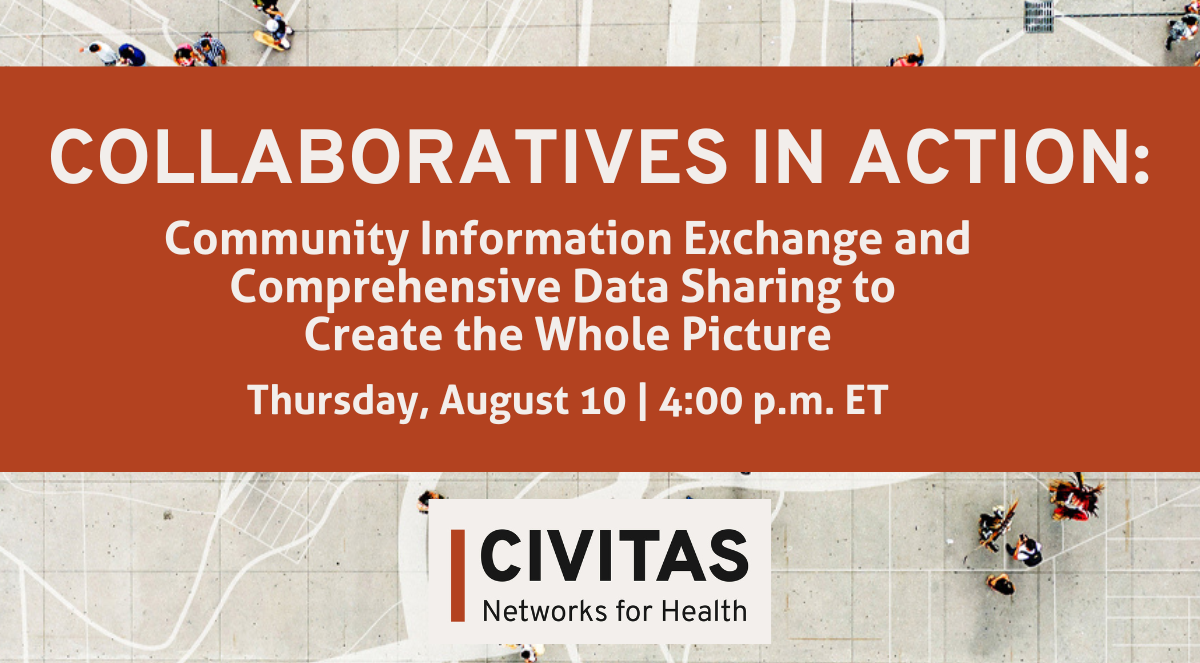
Collaboratives in Action: Community Information Exchange and Comprehensive Data Sharing to Create the Whole Picture
Thank you to all who joined Civitas Networks for Health for our second Collaboratives in Action event of 2023. Our spotlight presentation featured the following panelists:
- Alana Kalinowski, MSW, Director of Interoperability & Collective Impact, San Diego 211/CIE
- Brian Dillon, Consultant, Technology Strategy, Intrepid Ascent
- Danielle Carter, Vice President Community Change, Intrepid Ascent
This Civitas-hosted public webinar highlighted the topics below:
- Exploring the critical elements of data exchange including technical architecture, governance, and data ownership.
- Debunking myths about social determinants of health (SDOH) and behavioral health data sharing.
- Emphasizing the importance of using data and intentional partnerships to spark action.
In case you missed the event – or would like to revisit the conversation, a recording and presentation slides are now available!
July Network News | How Health Data Organizations Can Inform the Public
July Network News
On Wednesday, July 19, Civitas Networks for Health members from across the country gathered virtually for our monthly all-member forum, Network News. This month’s spotlight presentation featured four Civitas members who discussed How Health Data Organizations Can Inform the Public.
The presentation covered how National Association of Health Data Organizations members are working to bring together public and private data sources to create digestible information that benefits the public.
Civitas Networks for Health Welcomes 11 New Members During First Half of 2023
Civitas Networks for Health Welcomes 11 New Members During First Half of 2023
Organization Seeing Continuous Membership Growth and Interest Year-Over-Year
Washington, DC – July 10, 2023 – Civitas Networks for Health today announced the addition of 11 new organizations to its membership in the first half of 2023, representing continuous growth for the nonprofit organization. As the largest national network of its kind, Civitas is comprised of member organizations working to use health information exchange, health data, and multi-stakeholder, cross-sector approaches to improve health across North America.
Civitas’ membership is comprised of action-oriented thought leaders and implementers at the local, regional, state, and national levels. Organizations who have joined the network since January 2023 include BerryDunn, BluePath Health, Colorado Community Managed Care Network, Data Across Sectors for Health, Foundation for Health Care Quality, MetaStar, Quality Insights, Rhodes Group, Smile Digital Health, Workgroup for Electronic Data Interchange, and Zus Health. They represent and add to the deep expertise and community-serving functions of the Civitas network, with 166 member organizations working in every state in the nation.
Civitas’ Origins
Launching in October 2021, Civitas was formed by two national membership organizations joining forces, the Strategic Health Information Exchange Collaborative and the Network for Regional Healthcare Improvement. Now in its second year, the established organization is building on its strong foundation of long-standing member organizations by continuing to increase the diversity of members spanning:
- All-Payer Claims Databases (APCDs)
- Health Data Utilities (HDUs)
- Health Information Exchanges (HIEs)
- Quality Improvement Organizations (QIOs)
- Regional Health Improvement Collaboratives (RHICs)
- Strategic business and technology partners
The work Civitas members do is fundamental to improving health, moving the American health care system forward, and building the underlying infrastructure for health equity.
“Emerging from the pandemic, the work Civitas members are doing to connect health data to outcomes is more important than ever,” said Civitas CEO, Lisa Bari. “Our new members are incredible additions to the Civitas network, and we are grateful for their partnership and collaboration. We look forward to seeing new faces at our annual conference in August.”
Civitas Networks for Health 2023 Annual Conference
Civitas will convene the majority of its members and like-minded industry professionals at the #Civitas2023 Annual Conference, taking place August 20 through 23, 2023 in National Harbor, Maryland. Hosted in partnership with Civitas’ Chesapeake Bay Region Members, the conference will highlight public-private partnerships that inspire health transformation. As Civitas continues to play a key role in advancing interoperability nationwide, leading health improvement, and evolving the HDU model, conference speakers and panelists will primarily focus their remarks on the role of public-private partnerships to improve public health, support data modernization, and workforce development efforts, while applying a health equity lens. Keynote speakers will be digging into this topic and coming at it from various angles – attendees will hear keynote presentations from:
- Anne Zink, MD, Chief Medical Officer of the Alaska Department of Health, President of the Association of State and Territorial Health Officials
- Brian Castrucci, DrPH, MA, CEO of the deBeaumont Foundation
- Jennifer Layden, MD, PhD, Acting Director of the CDC Office of Health, Data, Surveillance, and Technology
- Judith Monroe, MD, CEO of the CDC Foundation
- Stella Safo, MD, MPH, Founder and Executive Director of Just Equity for Health
With hundreds of expected attendees–both virtual and in-person–anyone at the conference will be able to take part in important and interesting conversations about how we can collectively work to advance public health and health improvement initiatives with data across the country. View the full agenda and register today.
About Civitas Networks for Health
Civitas Networks for Health is a national nonprofit collaborative comprised of 166 member organizations working to use health information exchange, health data, and multi-stakeholder, cross-sector approaches to improve health. We educate, promote, and influence both the private sector and policy makers on matters of interoperability, quality, coordination, health equity and cost-effectiveness of health care, and as a 501(c)(3) nonprofit organization, lead multi-site grant-funded programs and projects. We are proud to support local health innovators by amplifying their voices at the national level and increasing the exchange of valuable resources, tools, and ideas. To learn more, please visit www.civitasforhealth.org.
The Role of Health Data Utilities in Advancing Interoperability and Addressing Current and Long-Term Health and Health Care Challenges
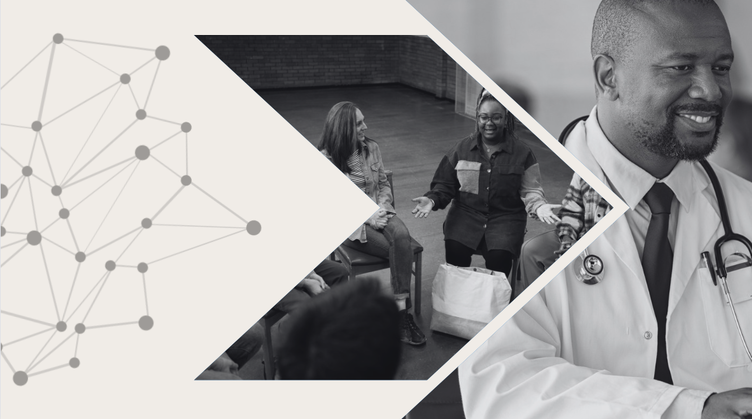
The Role of Health Data Utilities in Advancing Interoperability and Addressing Current and Long-Term Health and Health Care Challenges
Note: This article was written in collaboration with Kevin McAvey of Manatt, Phelps & Phillips, LLP. Check out Kevin’s recent work here: Realizing the Promise of All Payer Claims Databases: A Federal & State Action Plan.
For decades, U.S. government and industry leaders have looked for viable solutions to overcome the limitations of siloed electronic health record (EHR) systems, and to bridge the gap between health care and social services data and information. As the U.S. health care sector continues to undergo a vital digital transformation, the need for building stronger, more secure data that serves patients and the public while creating system interoperability is a national priority. We need comprehensive health data that allows for informed whole-person care both within the delivery of medical care and other community and social care settings.
For more than two decades, Health Information Exchanges (HIEs) have served as a primary source of secure health-related data sharing among local, regional, and statewide entities to provide more coordinated, efficient patient care. A recent US GAO report on electronic health information exchange reinforces this by acknowledging that survey data show that the use of electronic exchange among hospitals and physicians has increased in recent years. And today, to further bolster these capabilities, many state HIEs, regional health improvement collaboratives (RHICs), state health data organizations (HDOs), and other data-led non-profit entities are well-positioned to serve as a Health Data Utility (HDUs).
June Public Policy Briefing
June Public Policy Briefing
Unable to attend, or want to revisit the conversation? Materials are now available!
June Network News | Promising Practices on Consent Management to Support Medicaid Transformation
June Network News
On Wednesday, June 21, Civitas Networks for Health members from across the country gathered virtually for our monthly all-member forum, Network News. This month, we shared network updates, highlighted upcoming events and member stories, and heard from Robby Franceschini, JD, MPH, Director of Policy at BluePath Health, and Daniel Stein, MPPM, MBA, President of Stewards of Change Institute, on “Promising Practices on Consent Management to Support Medicaid Transformation.”
May Network News | Spotlight Presentation by The West Health Institute
May Network News
On Wednesday, May 17, Civitas Networks for Health members from across the country gathered virtually for our monthly all-member forum, Network News. During this month’s meeting, we shared network updates, upcoming events, member highlights, and received a presentation from Civitas member West Health Institute (WHI). Our spotlight presentation featured Liane Wardlow, PhD, MS, who is the Senior Director of Clinical Research and Telehealth with WHI. Liane highlighted WHI’s collaboration with the University of Virginia (UVA) Department of Geriatrics and the Mid-Atlantic Telehealth Resource Center (MARTC) in their co-creation of the Center of Excellence for Telehealth and Aging (CE4TA).
Event Recording | Gravity Project Information Session
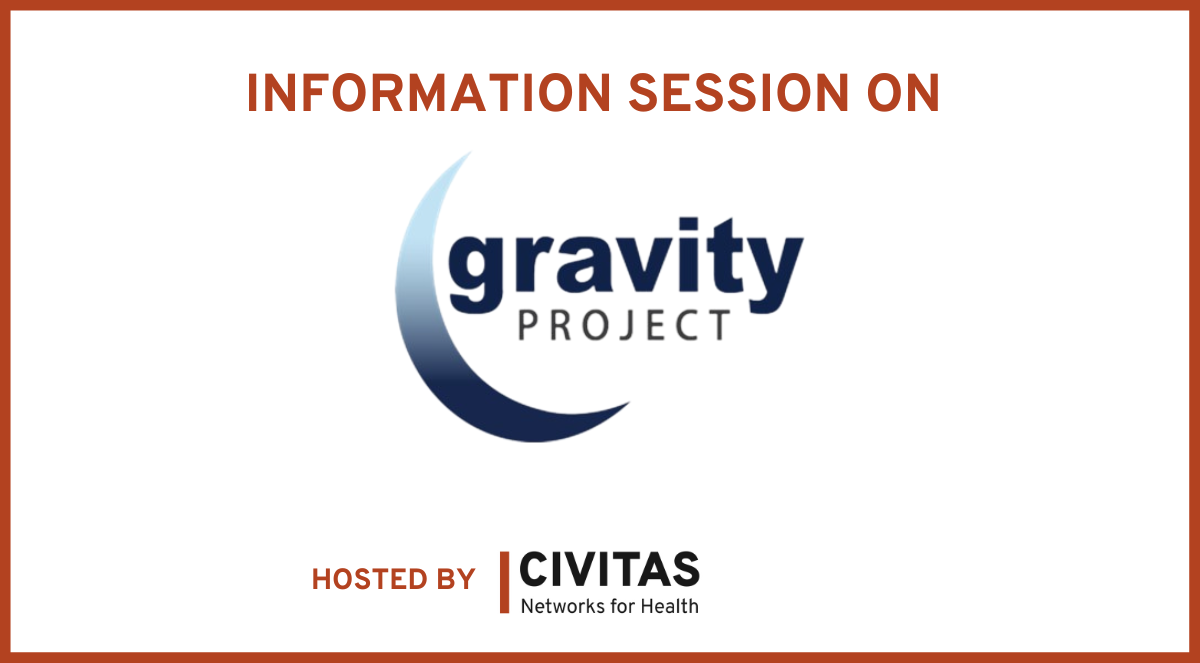
Event Recording | Gravity Pilots Affinity Group Meeting
Thank you to all who joined us on April 20 for our Gravity Pilots Affinity Group call, hosted by Civitas Networks for Health! The Gravity Pilots Affinity Group is a peer-to-peer learning forum for entities participating in the real-world testing of Gravity SDOH data standards. Our next Pilots Affinity Group meeting will be on Thursday, May 25 from 2:30 pm – 4:00 pm ET. We look forward to seeing you then!
In case you missed the event – or would like to revisit the conversation, a recording and presentation slides are now available!




